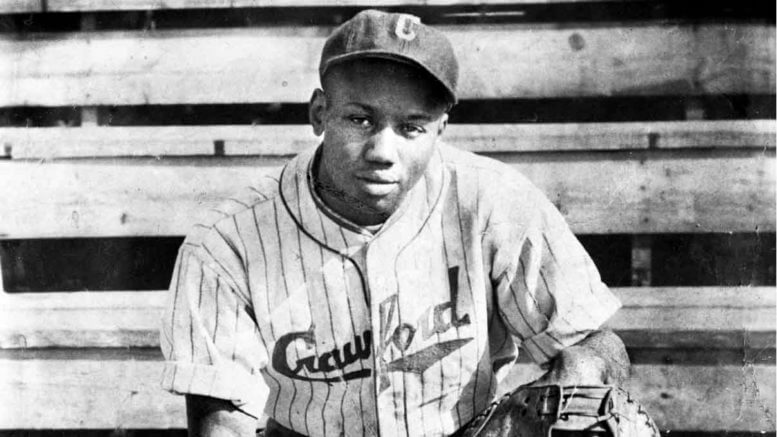If somebody asked you to name the “black Babe Ruth,” who would you say? Some might say Willie Mays or Barry Bonds. They might mention Jackie Robinson. The truth is the ballplayer most often referred to by that nickname isn’t even on most people’s radar.
His last name is Gibson. But if many, at least of a certain age, may know Kirk Gibson, this other Gibson is a player who left his mark on the sport and is once again in the spotlight. There are famous black ballplayers whose story is interwoven with the story of baseball, well beyond Jackie Robinson and other famous athletes.
Theater for the New City presented Josh: The Black Babe Ruth by Michael A. Jones last spring in its cabaret theater.
The black Babe Ruth is back in honor of Black History Month as the theater presents the show February 8 to 25, 2018 in its larger Cino Theater.
Jones’ play, set in the 1940s, presents the story of Josh Gibson, who went from the sandlots of Pittsburgh’s North Side to the pinnacle of greatness in the Negro Leagues. He’s also among the United States’ most famous, often forgotten, figures.
The show looks at his successes, sorrows and struggles to try to break into “the big leagues” and play with white players at a time when the sport was still segregated.
The play, directed by Bette Howard, mixes drama and humor to tell one of the more poignant stories in sports and society. It’s part of a larger slate of shows Theater for the New City is presenting to honor black history in Black History Month.
“He was considered one of the greatest home run hitters, most feared sluggers of any era, and called by many “‘the Black Babe Ruth,'” Jones, who also plays Josh Gibson, said. “Gibson left an undeniable legacy of greatness and accomplishment.”
The play, based on real events, is likely to tell the story of the best (or one of the best) ballplayers you never heard of.
Although Gibson never got to play in the “big leagues,” he would live on and be honored by the institution that today serves as a memorial to Babe Ruth and many other great ballplayers.
Gibson’s career in Pittsburgh as a member of the Homestead Grays, the dominant team in the Negro Leagues, led to his induction in the Baseball Hall of Fame in Cooperstown in 1972.
‘Josh: The Black Babe Ruth’ is story of a “Negro League baseball player who some say died of a broken heart,” Jones added. “Although his good friend and legendary pitcher Satchel Paige tries to shed light on the business of baseball, Josh is determined to make it into the ‘big leagues’ and show the world he can rival the greats, such as Babe Ruth and Joe DiMaggio.”
The play was first produced at Woodie King, Jr.’s New Federal Theatre before Theater for the New City debuted it in New York City. Now Josh is going back to bat, during Black History Month.
Bette Howard is an original member of the Negro Ensemble Company, which became the premier theater company of Black theater artists in the 1960’s and 70’s in New York City.
“Its focus was on original works with complex themes grounded in black life with an international viewpoint,” Jones added of that group. “NEC created a canon of theatrical works that set the stage and created the audience for writers who came later.”
The company included Denzel Washington, Lynn Whitfield, Samuel L. Jackson, and Phylicia Rashad and set the stage for writers such as August Wilson and Suzan-Lori Parks.
Jones’ other writing credits include “It Takes a Village to Raise…Hell,” produced by The Marian Holding Theatre; “Family Matters,” produced at Pittsburgh Playwrights Theatre Company and “Angela’s Justice,” produced at Theater for the New City.
His play “The Skin I’m In” has been touring the New York City public schools and he is a founding member of the Uptown Playwrights’ Workshop. As an actor, Jones won two AUDELCO Awards for performances in “A Night with August Wilson’s Women” and “Fences.”

